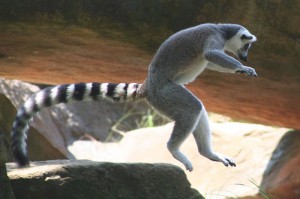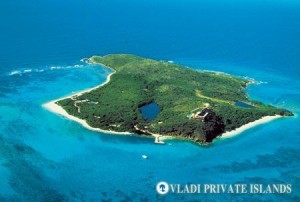The flamboyant head of the Virgin conglomerate wants to create a refuge for threatened lemurs on one of his two islands in the BVI – however, this plan has sparked a local controvery.
UK billionaire Sir Richard Branson is reportedly intending to import two dozen ring-tailed lemurs to his private Moskito Island in April. Acquired from zoos around the world, he hopes to give the near-endangered creatures a natural habitant within the island’s tropical rainforests. In a March 4th interview with the BVI Beacon, he said of the lemurs that; “They’re very beautiful…I think that the kids of the BVI will get enormous pleasure from school visits to Moskito and Necker to see them.”
Found between Virgin Gorda and Branson’s other island, the famous Necker, the virtually-untouched Moskito Island seems like an ideal place for lemurs to seek sanctuary. Taking its name from a local Caribbean tribe rather than the pesky insect, the 120-acre island, also known as Drake’s Passage, is the prospective home of an eco-resort that Branson plans to run entirely from sustainable energy. There should be no shortage of eager visitors – nearby Necker, established as a boutique resort over three decades ago, currently rents for more than US $50,000 per day. But with a resort on Moskito a long way from opening, the island is now left to the animals – including plenty of lizards, birds, and very soon, the lemurs.
Native only to Madagascar, the highly distinctive ring-tailed lemurs have suffered from extensive habitat destruction in the wild, although breeding programs have proven successful enough to keep their population at relatively safe levels. Numbering over 2,000 individuals in captivity, these cat-like primates have been prevented them from falling into the IUCN category of “endangered”, instead being given the less-serious designation of “near-threatened.” The animals Branson intends to import will be coming from zoos in Canada, South Africa and Sweden.
However, the article in the BVI Beacon suggests that there has been a surprising amount of controversy generated by Branson’s plans. While he was eventually given permission to move forward with the importation, some members of the public and the local government raised concerns that the lemurs were capable of spreading exotic diseases, and would pose a threat to native species. One such critic is Lorie Rymer, running for office in Branson’s district, who has said that importing the lemurs is irresponsible and that approval was wrongly given against the advice of agencies such as the Ministry of Agriculture.
On the other hand, BVI’s Minister for Natural Resources and Labour, Omar Hodge, defended his final decision to approve Branson’s plans. “If visitors…desire to have monkey in their bed, or see them in the trees, then it should not be an issue.” He reassured those with concerns about the lemurs that they are terrified of water and would not leave the island, and suggested that critics should consider that dogs and cats are also capable of carrying rabies and other diseases.
According to an application submitted by Branson to import the lemurs, they will need to be “healthy and free of infection and contagious diseases, including the herpes virus group, tuberculosis and yellow fever.” The BVI government’s chief veterinary officer, Michael Montrose, reaffirmed that each lemur would be inspected to ensure there was no public health risk prior to importation approval being given. Branson has also stated that the animals would have an extensive quarantine period.
There are critics, however, who raise other concerns aside from the threat of disease. The BVI Beacon quoted Dr. “Skip” Lazell, an expert biologist who spent decades studying the ecology at Guana Island (another private island in the BVI), as saying that it was a “terrible idea” to import the animals into a small, relatively simple island ecosystem. “They eat everything. They eat lizards. They eat fruits. They eat roots, insects, bird eggs, absolutely everything,” he said. He raised concerns that a rare local species, the dwarf gecko, could be decimated.
Despite the opposition, Branson believes that Moskito Island wouldn’t suffer undue harm from the introduction of lemurs, focussing on the positive impact of saving the creatures and giving them a closer approximation of a natural habitat than they would find in zoos. “There’s very little on Moskito Island, and I think that if we can protect the lemur,” he said, “…I think it would be a good thing to have done in one’s lifetime.” And as long as Branson can manage a balance between Moskito Island’s natural biodiversity and the lemur newcomers, his optimism may be very well-founded.
Read the local article here: http://www.bvibeacon.com/1/index.php?option=com_content&view=article&id=266:branson-lemurs-are-coming&catid=80:local-news-march-17-2011




